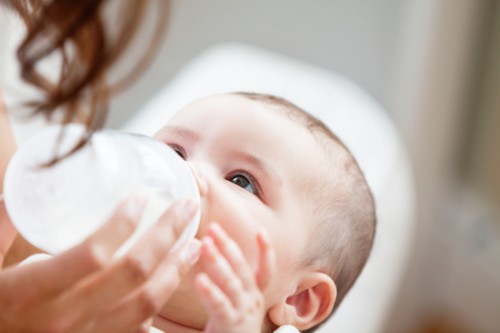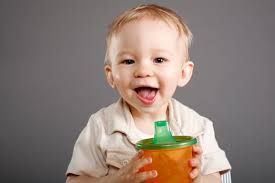Most parents feel quite confused when it comes to introducing new food in the lives of their newborns. There are so many things to consider before making any change to the diet of your newborn. You have to consider safety, timing, and nutrition before selecting anything for your baby. You have to follow several rules when making a choice. If you do not consider certain things, even water can cause trouble.
When to Give Baby Water
You should not give your baby water until he is older than 6 months. It is mainly because he gets all the hydration from breast milk until that age. If you don't breastfeed, formula milk helps keep them hydrated. You can give him sips of water once he turns 6 months old. Just avoid overdoing it or it may lead to a tummy ache. You can give him water more regularly once he is one-year-old.
Why Is It Unsafe to Give Water Before 6 Months?
You already have an idea about when to give baby water, but you may be wondering why exactly you should avoid giving water to your baby who is not 6 months old yet. The biggest concern is that water can suppress appetite and keep a baby from eating enough of nutritious food. In case your baby is under 6 months, he may not get enough nutrition from his feedings if you are giving him water as well. This may even lead to weight loss. You may even notice a decrease in your breast-milk supply if you stick to this routine for long.
You also need to bear in mind that giving water to a baby under 6 months can lead to oral water intoxication, which affects the electrolytes balance in the body. These electrolytes become diluted in the bloodstream and affects normal bodily functions. If you notice your baby become confused, irritable, or drowsy with facial swelling and low body temperature, this may indicate water intoxication in infants.
Safe Tips for Giving Baby Water
 It is important to understand when to give baby water, but it is equally important to know how to give it to them. Here are a few things to consider:
It is important to understand when to give baby water, but it is equally important to know how to give it to them. Here are a few things to consider:
- Never introduce water to stretch breast milk or formula milk. If you are using formula milk, be sure to mix it as per the directions on the package. Always ensure that you are not adding extra water. The best thing is to feed breast milk "full strength" to avoid causing any imbalance of sodium and water.
- Do not give them extra fluid when they are eating a variety of food. You may think your little angel is not drinking enough water, but you may not know that vegetables, fruits, and purees are already quite high in fluids.
- Be sure to have information about your water source before giving it to your baby. You have to check if your local tap water contains a substantial amount of natural fluoride or not. You should use fluoride-free water, especially if your local tap water contains more than 0.7parts per million (PPM) of fluoride. You will be better off using a ready-to-feed formula if you believe the risk of fluorosis is high. Moreover, you may consider giving your child fluoride supplements if your local drinking water contains less than 0.3 PPM of fluoride.
- Give your baby small sips of water. Limit it to mealtimes only because this will help lower the risk of tooth decay in babies. Just ensure that you are not giving too much fluid that makes your baby eat less of nutritious food.
- You can give water to your toddlers along with breast milk. You do not need to give too much of water because breast milk is an excellent source of fluids and nutrients. Still, you may want to introduce some water if your toddler has started eating solid foods. Water will help prevent constipation in this case.
Can You Give Your Baby Juice?
 Now you know when to give baby water, what about juices? You will be better off keeping juice out of the diet of your little angel. It will fill up your baby's tummy quickly and leave no room for something more important – that is milk. Juices also contain sugar that can cause diarrhea and stomach cramping in babies. You can introduce juices once your baby starts eating solids. Even then, you should ensure that you are giving them 100% fruit juice without any added sugar.
Now you know when to give baby water, what about juices? You will be better off keeping juice out of the diet of your little angel. It will fill up your baby's tummy quickly and leave no room for something more important – that is milk. Juices also contain sugar that can cause diarrhea and stomach cramping in babies. You can introduce juices once your baby starts eating solids. Even then, you should ensure that you are giving them 100% fruit juice without any added sugar.
When you decide to give them juice, be sure to offer it in a cup, not a bottle. Do not give them more than 4oz of juice a day. Make sure to give it to them with a snack or meal to ensure it does not deprive them of important nutrients.
